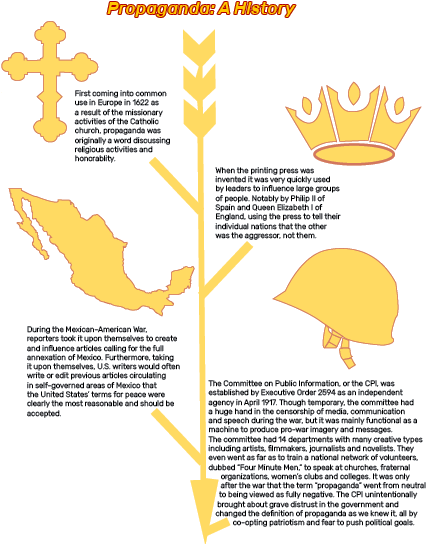48.9% of people at Blue Valley believe they are susceptible to propaganda, while the remaining 51.1% of people are either unsure or do not believe they’re immune to propaganda.
One may look back at old publicity and wonder how people fell for it, but future generations may look back on us and wonder the exact same thing. Propaganda did not disappear after World War II, or once the Soviet Union fell, or after any historical event, it simply grew and evolved with the times. Propaganda still exists in the digital age — it’s just structured around the society of our time so we may fall into it.
Professor and Director of the Media Education Lab at the University of Rhode Island, Renee Hobbs, claims the average person encounters propaganda at least once an hour in news, entertainment, social media and more.
“We’ve known for a long time that you can bypass people’s critical thinking by activating strong emotions and responding to audience’s deepest hopes, fears and dreams by simplifying information,” Hobbs said in an interview with Harvard.
One of the most prominent modern day examples being the military-entertainment complex, which is a term used to describe the relationship between the United States Department of Defense and the entertainment industry. This set up allows costs of productions to be cut through taxpayer funding, military consultation and set location; the only catch
 is that the U.S. military must be portrayed in a positive light.
is that the U.S. military must be portrayed in a positive light.
This leads to games like Call of Duty, that focus on showing the heroism of being in the military and less on the horrors of what war does. Similarly, all pre-Avengers Marvel movies and many following were partially funded by the U.S. military.
Both of these are important because of the subtle messaging given to viewers. When people admire so
meone, even fictional, they also idealize the actions and beliefs of said person and are less likely to question those exact things.
So when the military portrays war and the actions of military personnel, or turns them into superheroes in only a positive light in the media, it makes discussion around the subject much more difficult.
“When you start to learn about propaganda, you inevitably realize the value and the importance of multiperspectival thinking,” Hobbs said.
Much like most ad placements nowadays, propaganda makes a conscious effort to be less in-your-face about what it is trying to do, which is why it’s important to look into and develop multiple perspectives on issues.
The way to truly protect yourself from it is to make sure you look at the media you’re consuming with a critical eye, and to be cognitive of how you perceive the messages in said media.
Society not immune to propaganda — one shoot root themself in reflection.




